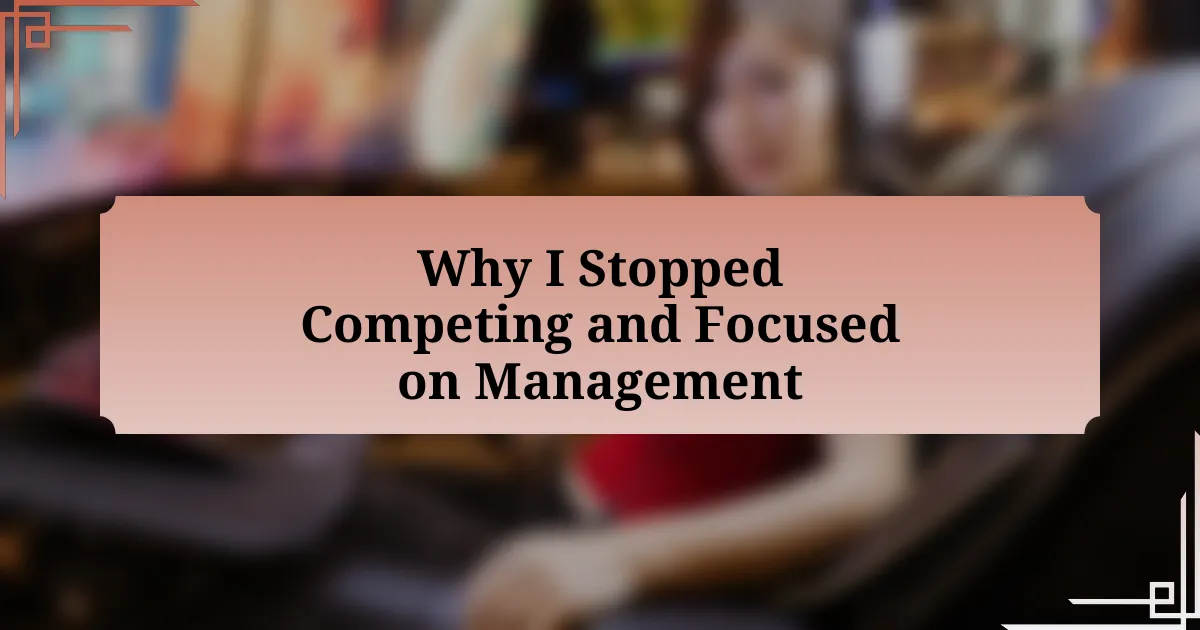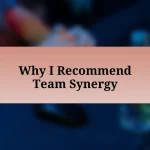Key takeaways:
- eSports is not just about competition; it fosters community, relationships, and personal growth through shared experiences.
- Transitioning from player to manager brings new insights about team dynamics, communication, and leadership, emphasizing empathy and adaptability.
- Prioritizing player well-being is crucial; neglecting mental health can significantly impact performance and team morale.
- Building strong relationships with stakeholders leads to valuable partnerships that benefit all parties involved.
Author: Evelyn Hartley
Bio: Evelyn Hartley is an award-winning author known for her compelling narratives and richly drawn characters. With a background in psychology and literature, she weaves intricate tales that explore the complexities of human relationships and the intricacies of the human psyche. Her debut novel, “Whispers in the Dark,” was celebrated by critics and readers alike, earning her a dedicated following. Evelyn’s work has been featured in various literary journals and anthologies, and she frequently speaks at writing conferences and workshops. When she’s not writing, she enjoys hiking in the mountains and volunteering at her local animal shelter. She resides in Seattle with her two rescue dogs, Luna and Milo.
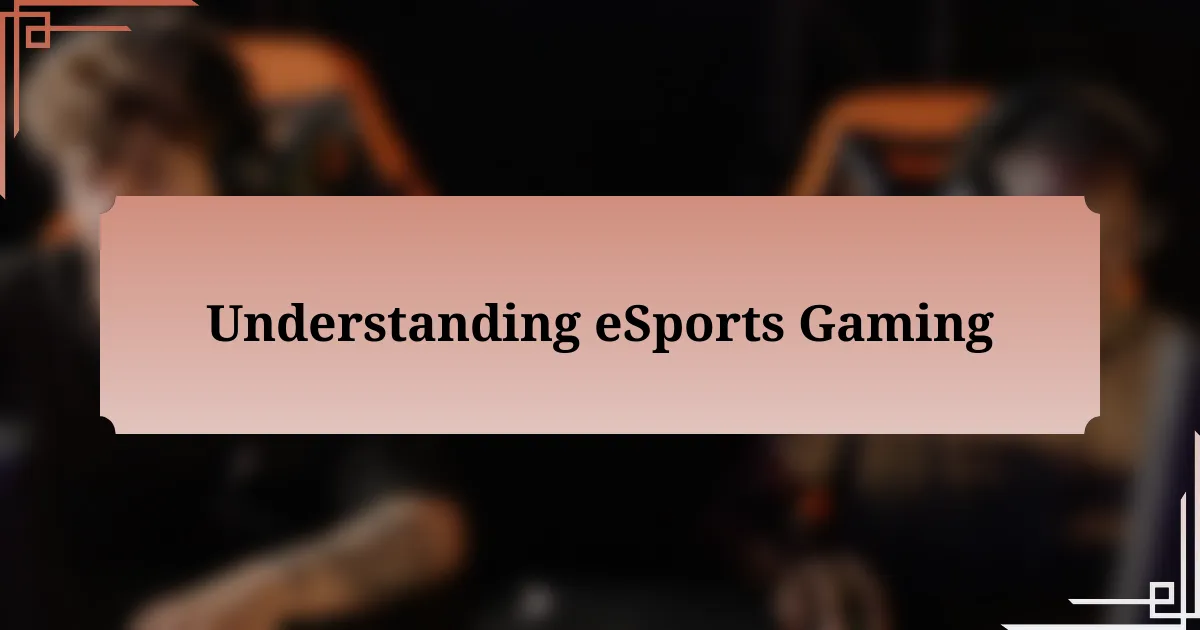
Understanding eSports Gaming
eSports gaming is a vibrant and multifaceted world that goes beyond just playing video games. I remember attending my first live tournament, where the energy was palpable; fans were cheering, and players were intensely focused on their screens. It struck me that eSports isn’t just a hobby—it’s a competitive arena that brings people together, creating a community built on shared passion and thrill.
There’s something fascinating about the strategic depth involved in eSports. I often find myself drawn to how the best players analyze their opponents, adjust their strategies on-the-fly, and adapt to the dynamic flow of the game. Have you ever stopped to think about how much mental agility and teamwork are required to succeed? It’s not merely about individual skill; it’s a complex interplay between communication and strategy.
As I delved deeper into the world of eSports, I realized it’s not just about winning but also about the relationships and experiences forged along the way. Each match tells a unique story, framed by countless hours of practice and dedication. I’ve witnessed friendships blossom among teammates, and rivalries spark in the heat of competition. The emotional rollercoaster that comes with each game is what makes eSports a captivating phenomenon.
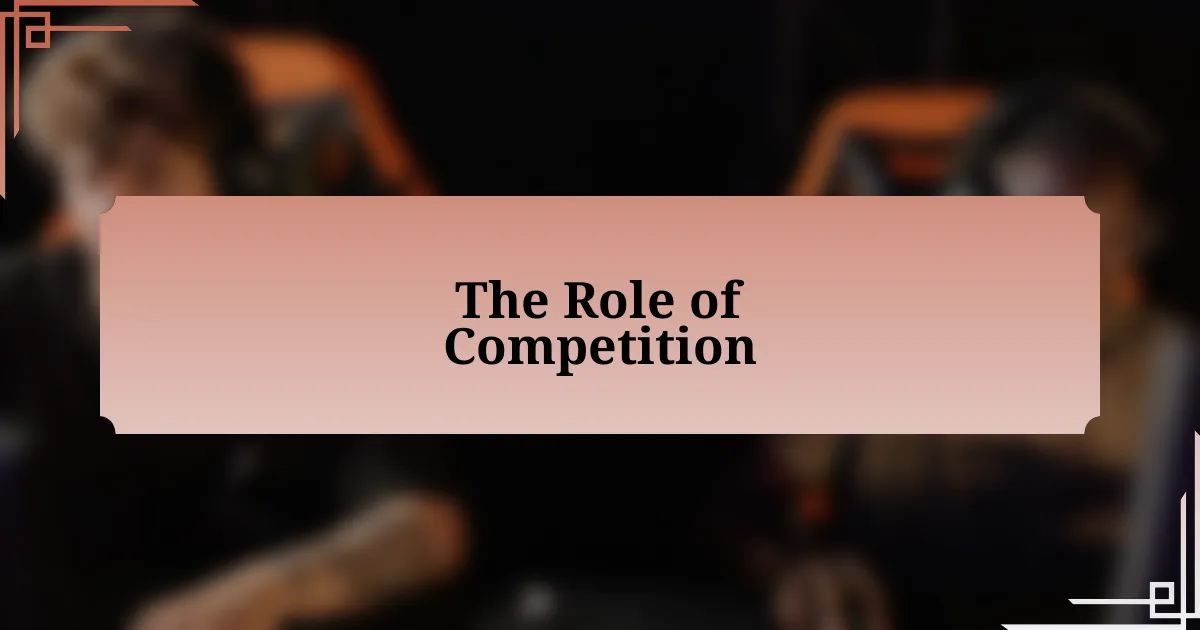
The Role of Competition
Competition plays a pivotal role in shaping the landscape of eSports. When I was an active player, each tournament felt like a defining moment; the pressure sharpened my focus and pushed me to continually improve. I often found myself wondering and debating with friends: What drives us to compete? Is it the thrill of victory, or something deeper, like the desire for recognition and self-improvement?
As I transitioned away from competition, I began to see how the intense rivalries fueled innovation in game strategies and player development. I would spend hours dissecting match replays, marveling at how competitors learned from their defeats. It’s fascinating to think that every loss can be a lesson—a stepping stone toward becoming an even better player.
Moreover, the competitive spirit in eSports fosters a sense of community. I recall the camaraderie that formed among players, despite being adversaries in-game. This shared experience creates bonds that run deep, highlighting how competition can be a force for connection rather than merely an endpoint. Reflecting on this, I often ask myself: isn’t it the shared journey, rather than just the competition itself, that enriches our experiences in gaming?
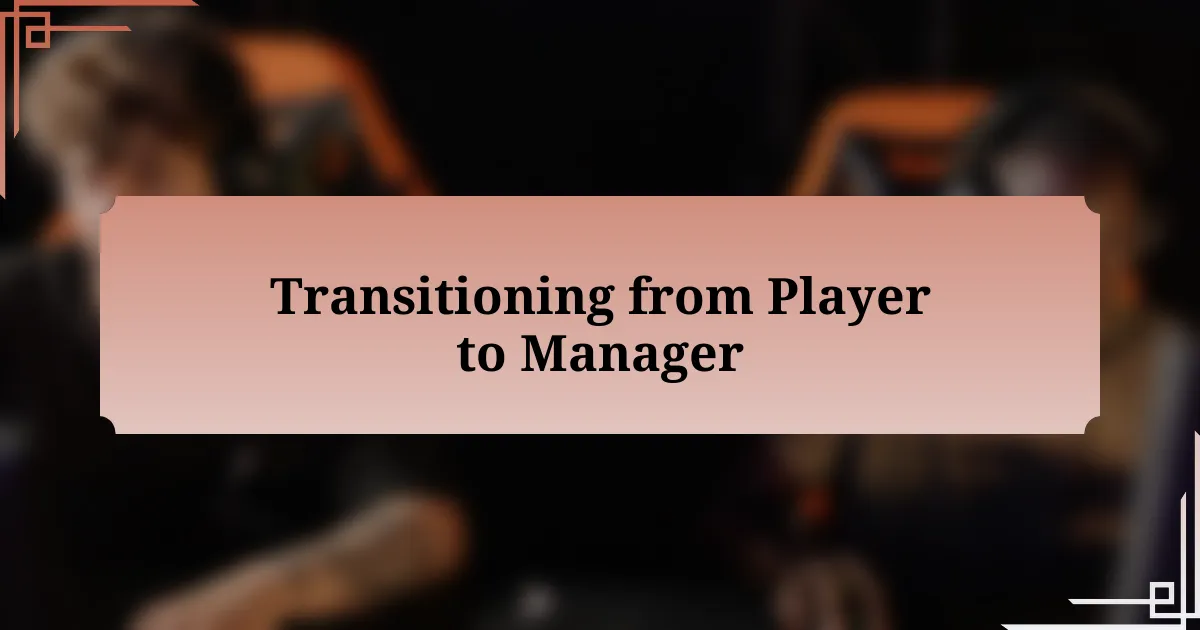
Transitioning from Player to Manager
Transitioning from being a player to a manager was a unique shift that took some getting used to. I remember stepping into my first management role and feeling a mix of excitement and uncertainty. Suddenly, instead of focusing solely on my gameplay, I had to consider the strengths and weaknesses of others. It was fascinating to witness how different personalities and skill sets came together to form a team dynamic. Have you ever thought about how a good manager must juggle strategies while fostering team morale? I soon realized that managing players requires a nuanced touch—something I had never fully appreciated during my playing days.
As a player, I was deeply immersed in my own performance, but management opened my eyes to the bigger picture. I often recalled moments from my competitive days where I felt frustrated with team decisions, unknowingly placing myself in the shoes of my previous managers. It was illuminating to grasp the challenges they faced, from balancing individual aspirations with team goals to ensuring that everyone felt valued. Have you ever questioned why some teams thrive while others struggle? I learned that effective communication and adaptability become paramount when guiding a diverse group of players who each come with their own dreams.
In my role as a manager, I found gratification in nurturing talent and witnessing their growth. There were countless moments where I felt immense pride watching my players succeed, almost as if I were reliving my own victories. Each time one of them landed a key play or secured a win, I experienced a surge of joy, like a second chance to compete. Is it possible that what I gained from this role far surpassed the thrill of individual matches? Reflecting on my journey, it became clear that leading a team redefined my connection to the sport, transforming competition into collaboration.
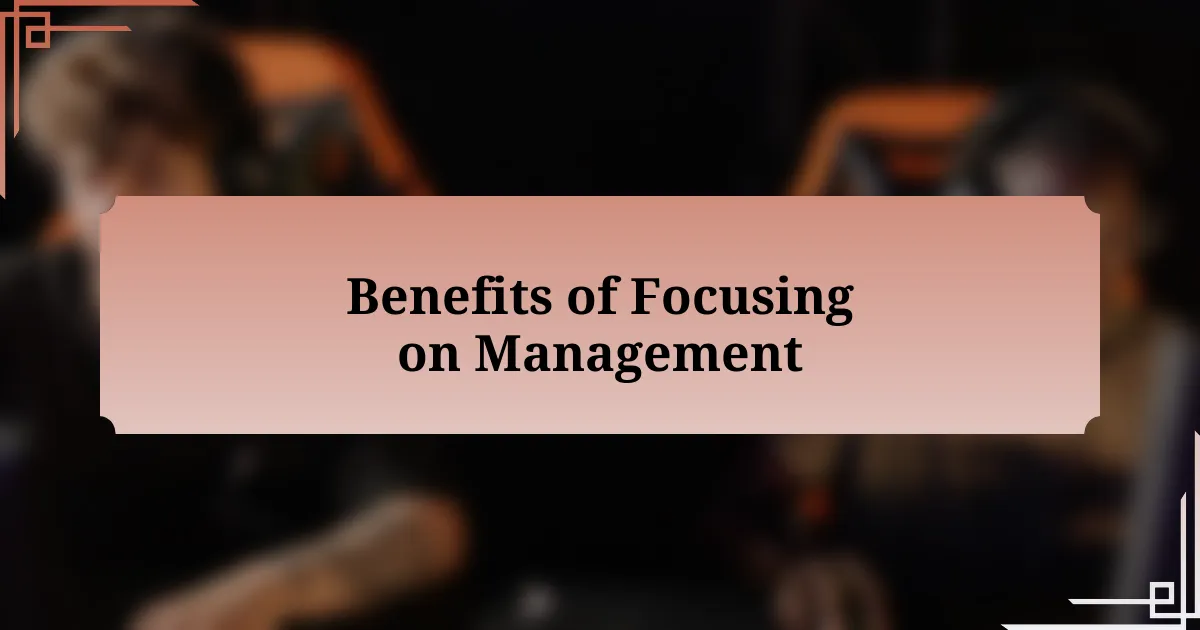
Benefits of Focusing on Management
Focusing on management has really deepened my understanding of the eSports landscape. I vividly remember the first time I successfully implemented a new training regimen for my team. Watching my players flourish under this streamlined approach was rewarding; it felt like I was crafting their path to victory, rather than just chasing my own. Have you ever experienced that satisfaction of seeing someone excel because of your guidance? For me, it was a transformative feeling.
Another benefit I noticed was the development of valuable leadership skills. Managing a diverse group of gamers, each with their own unique motivations and styles, required me to adapt continually. I recall struggling at first to connect with a particularly introverted player, but as I learned to approach him in a way that felt comfortable, our communication improved dramatically. This taught me that leadership isn’t just about authority; it’s about tuning into your team’s needs and creating an environment where everyone can thrive. When was the last time you considered how pivotal empathy is in achieving team success?
Finally, focusing on management allowed me to build a robust network within the eSports community. Through attending industry events and communicating with other managers, I’ve gained insights and resources that enrich my understanding of eSports. I remember the thrill of exchanging strategies over coffee during a tournament—those connections have proven invaluable as I navigate challenges. Have you thought about the potential of broadening your influence within the gaming world? This collaborative spirit has not only benefited my team but enriched my own professional journey as well.
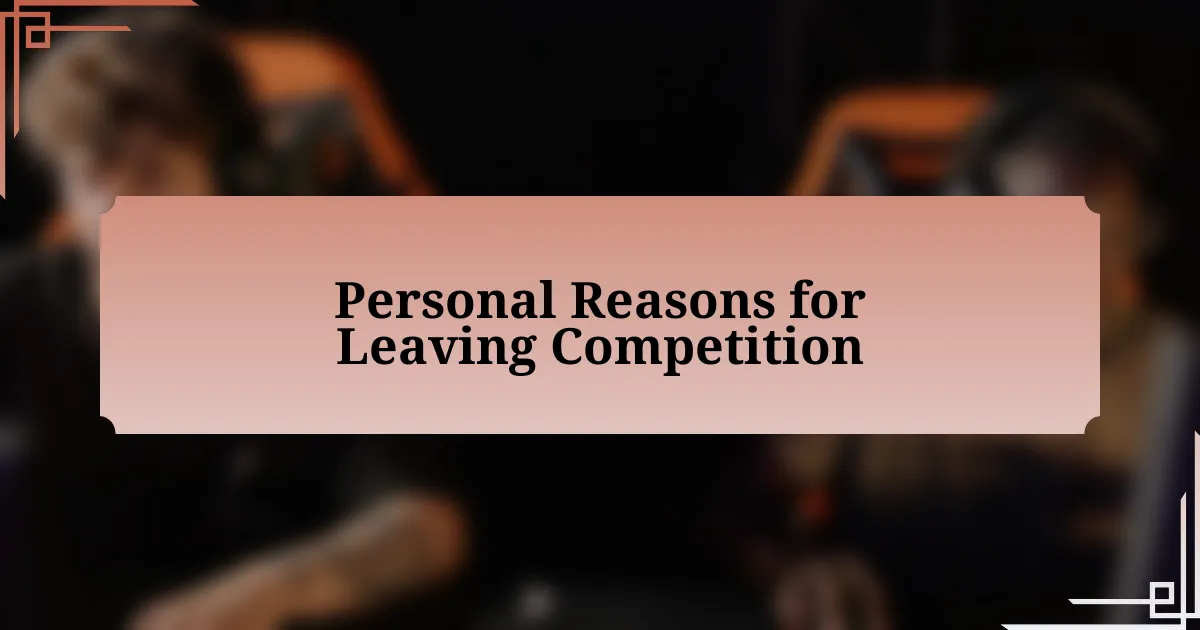
Personal Reasons for Leaving Competition
Leaving competition was a significant step for me, driven by personal revelations about my priorities. I recall a particularly grueling tournament where, despite the adrenaline and excitement, I found myself questioning what truly mattered. The pressure to perform began to overshadow my love for the game itself. Have you ever felt that what once brought you pure joy is now a source of stress? For me, choosing management became a path toward rediscovering that passion.
There was also the weight of physical and mental fatigue that played a crucial role in my decision. I’ll never forget the early mornings and late-night practice sessions that left me drained. Sure, the thrill of competing was exhilarating, but the impact on my well-being began to take its toll. Reflecting on my experiences, I realized that my sustainability in the gaming world hinged on embracing a role that prioritized balance over burnout. How can anyone perform at their best if they’re constantly running on empty?
Lastly, the evolution of my personal relationships contributed to my choice. I found myself missing important moments with family and friends while chasing the next victory. A turning point came when I attended a family gathering — someone mentioned how they never saw me anymore, and it hit hard. I pondered, why should I sacrifice meaningful connections for fleeting accolades? Shifting my focus to management allowed me to nurture those relationships while still contributing to the eSports community. Have you assessed how your competitive pursuits impact your personal life?
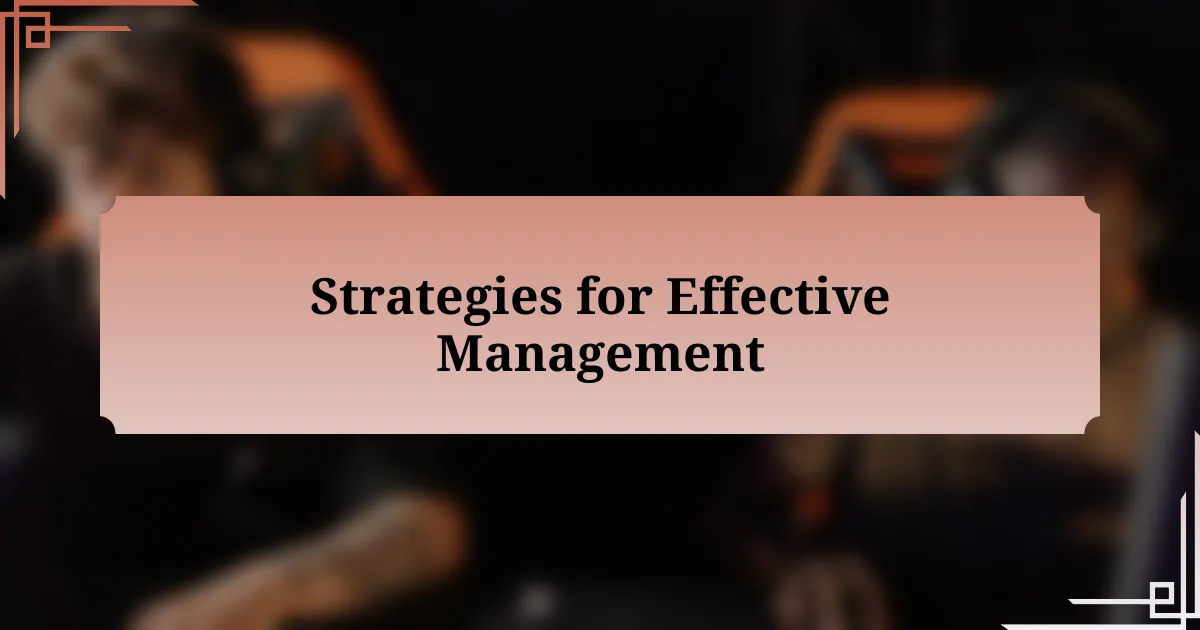
Strategies for Effective Management
Effective management in eSports goes beyond just overseeing a team; it requires fostering a positive environment where players can thrive. I remember one instance where I organized a team-building retreat. Seeing my players connect on a personal level redefined our dynamic. Have you ever noticed how a shared experience can transform a group? It’s those moments that build trust and cooperation, ultimately leading to better performance in tournaments.
One strategy that I’ve found particularly valuable is open communication. Encouraging team members to voice their thoughts creates a culture of transparency. I recall an important meeting where a player shared their anxiety about an upcoming match. By addressing these concerns openly, we could collaboratively develop a tailored game plan, transforming anxiety into confidence. Don’t you think that giving everyone a voice can unlock hidden potential within the team?
Furthermore, setting clear goals is essential for maintaining focus and motivation. I find that breaking down short-term objectives into manageable tasks helps keep the team engaged. During a challenging season, we mapped out our goals week by week, celebrating small victories along the way. Isn’t it rewarding to acknowledge progress, even the little milestones? This approach not only cultivates a sense of achievement but also strengthens our bond as a team.
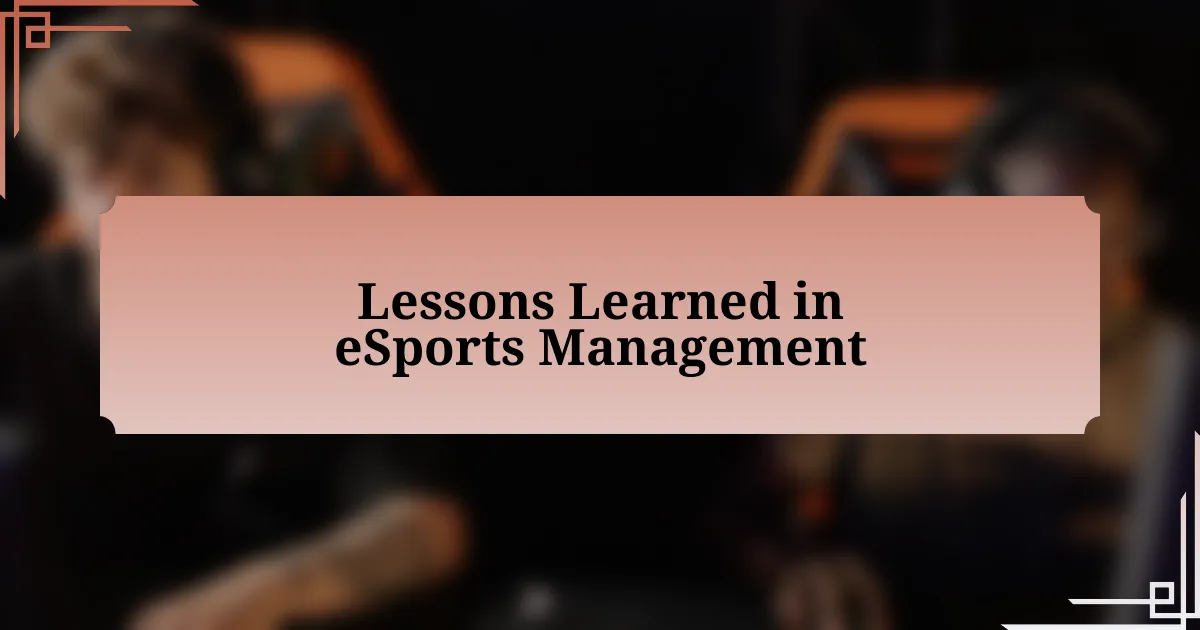
Lessons Learned in eSports Management
One of the most impactful lessons I learned in eSports management is the importance of adaptability. I recall a moment when our game’s meta shifted dramatically just before a major tournament. We had to scramble to adjust our strategies and ensure that everyone was on the same page. This experience taught me that flexibility isn’t just a concept—it’s a necessity in a fast-paced environment. Have you ever faced a sudden change that pushed you to rethink your approach?
Another critical takeaway is the value of player well-being. I once made the mistake of prioritizing win rates over mental health. After facing a string of poor performances, I noticed a decline in morale. It was a wake-up call for me; I began to implement regular check-ins and stress management resources. This shift not only improved our overall atmosphere but also enhanced our gameplay. Isn’t it fascinating how the mental state of the players can significantly impact their performance?
Lastly, building relationships with stakeholders—like sponsors and game developers—has been invaluable. I learned this firsthand when I reached out to a potential sponsor and shared our vision. The partnership grew beyond just financial support; it turned into a collaborative effort that benefited both parties. Why is it that sometimes the human element in these relationships can lead to groundbreaking opportunities? The answer lies in the trust and mutual respect we cultivate along the way.

